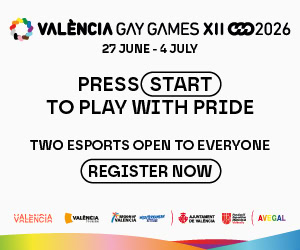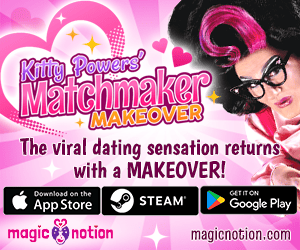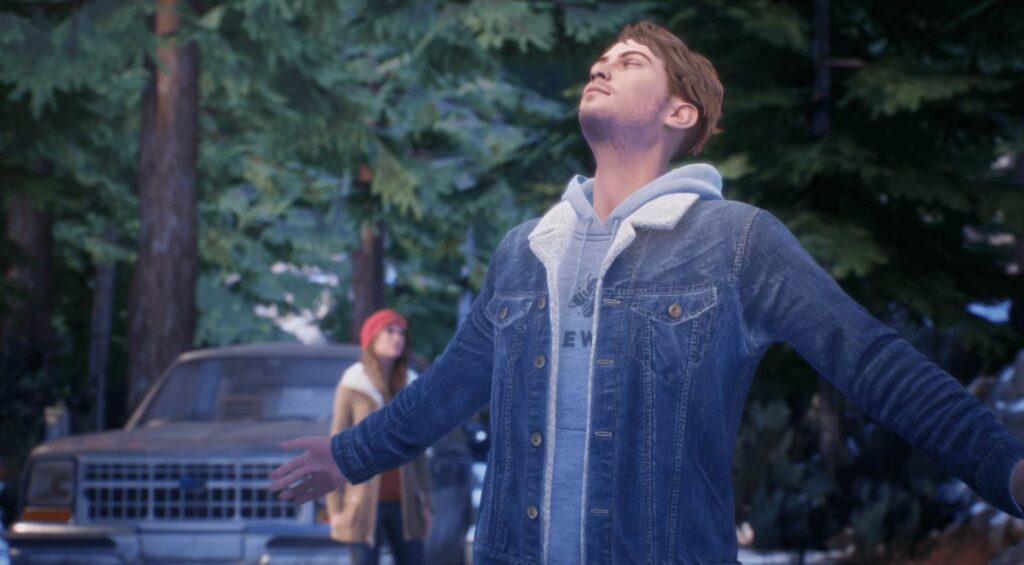
Creating Tyler Ronan: How DONTNOD created the first major transgender protagonist in video games
Tell Me Why, the latest episodic adventure game from DONTNOD, makes history as the first game from a major studio to feature a transgender protagonist, Tyler Ronan, but it can also now go down in history as the first major transgender character to truly be written well. He’s not shuffled off to the background like Krem, his story isn’t defined by surface-level transness and wrapped indelibly in trauma like Lev, and he isn’t misgendered, abused, or humiliated like…far too many to list.
To find out exactly how Tyler was created, we spoke to Morgan Lockhart, Lead Writer for Tell Me Why, Clay Carmouche, Narrative Director at Xbox Publishing, and Nick Adams, Director of Transgender Representation at GLAAD and a consultant on the game.
I don’t think I’ve ever heard a character in a video game describe themselves as transgender. They’re always ‘different’ or ‘don’t fit in’, or they get deadnamed (Tyler never does, for what it’s worth). Tyler describes himself as a trans man on a few occasions, and the game is peppered with in-jokes and little references to t-shots, binders, and more of the everyday transgender paraphernalia. Lockhart explained that Tyler owning his transness wasn’t particularly a conscious choice so much as it was a realistic one. “We wanted to tell a story that felt true to life and true to a character of his age. In conversations we had with colleagues, and with GLAAD, and with August [Black also a trans man], our actor for Tyler, what came through was the way they wanted Tyler to be represented. And that included being very proud of his identity and being very frank about his identity.”

Seeing yourself reflected was an important point Adams touched on too. “Trans men and transmasculine people have largely seen nothing being reflected back to them from screens. And when you don’t see yourself at all, it makes it hard to figure out if there’s a future for you, or if there’s a place in society for you.”
In his time at GLAAD, Adams has seen a lot of poor trans representation, and he described how this realistic approach helped Tell Me Why avoid the more common pitfalls. “One of the things we’ve seen a lot is this reducing of trans characters down to their transness and that’s the only thing about them. The extreme opposite version of that is to create a trans character and then never mention it, or to mention it once in the first five minutes and it’s never mentioned again. And I think that’s sometimes a liberal overcorrection, where they want to make it like being trans is no big deal at all,” Adams told us. “I think Tell Me Why hits that nice middle part where Tyler has a lot of things going on in his life, but the fact that he’s trans does impact everything about his history and going back to the town where he was raised, of course being trans is going to be part of that experience.”
Part of this realism is down to the ad-lib heavy approach DONTNOD takes to their games, where the voice actors are encouraged to help mold their character. With Tyler, that went double, Lockhart said, describing how crucial August Black’s voice was to creating Tyler’s own. “We talked a lot with August early on when we started working with him. We talked with him about his own experiences and then as we went we always told him ‘if you have feedback on this, something doesn’t ring true, give it to us and we’ll figure out how we can write it together.’”
“There’s a lot of August in Tyler,” Carmouche said, “I think we were able to have conversations with August on the side.”
Tyler, however, is not the only queer character in the game. There’s also Michael, a gay Tlingit man, who is a possible love interest for Tyler. “DONTNOD has a history of providing queer romance opportunities, and I think it just never occurred to us not to [have one again],” Lockhart said. Carmouche added that GLAAD’s role in Tyler’s writing helped develop his romantic side, and threw up new questions for them to explore. “In early conversations with Nick [Adams], that was something that he was super excited about Tyler being able to explore. And then we were kind of confronted with how do we explore that? Do we just decide he is of a certain orientation or sexuality, or do we allow players to experience that?”
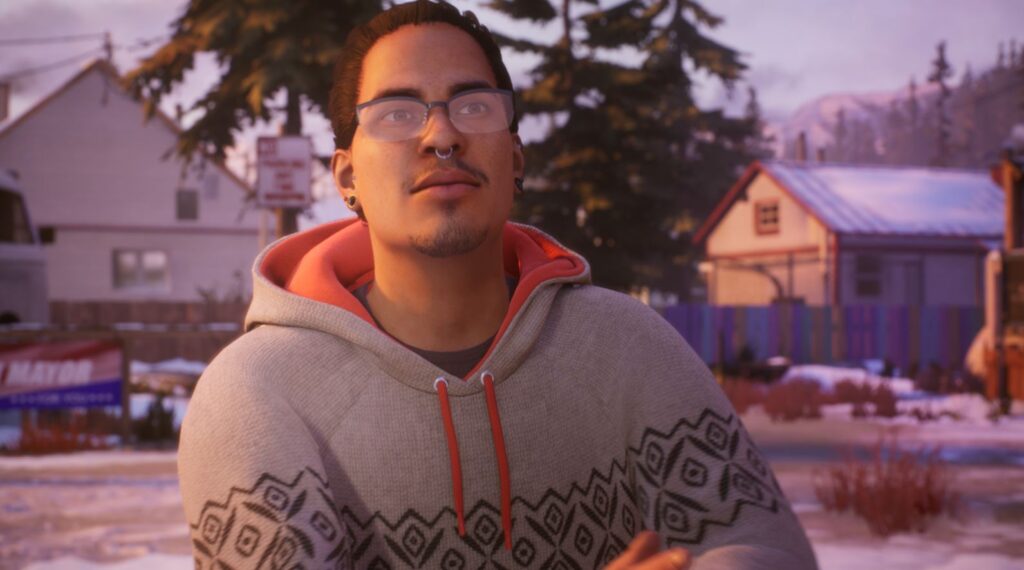
The answer was to take away the traditional romance options, and instead explore Tyler’s choice through continued in game dialogue. This more subtle way of shaping Tyler’s romantic orientation also leaves much more room for player interpretation, as Lockhart explained, “There’s room in there if you believe that Tyler either isn’t specifically interested in Michael or isn’t gay or possibly is ace. You could make all those choices kind of in the options that you have – you can have different versions of Tyler.”
I played Tyler as gay, and the storyline led me to easily my favourite scene in the game, which came in Chapter Three. It cannot be overstated how important this scene is. Tyler is already groundbreaking as a trans man leading a major video game, but then to take such a subtle view of his sexuality, which culminates this gorgeous Chapter Three scene, is outstanding storytelling. It mixes masculinity and queerness together with subtlety and ease, and produces one of gaming’s best scenes this year. You’ll know it when you see it.
While the game definitely avoids the stereotypical pitfalls of trans representation, it does present a warts and all depiction of life as a trans person, including the microaggressions and awkward moments. Adams especially felt like this was crucial for the game to include, as he said “if they had ignored that part of being trans, it would have been a missed opportunity. My goal in working with them was to say ‘this is what it’s really like to be a transmasculine person walking in the world’. Sometimes these things come up, it’s just part of our daily existence. And showing them is perfectly fine.”
The game never feels voyeuristic or like a cisgender take on transness, but by pure percentages, more cisgender people are more likely to play this game than transgender people. DONTNOD and Adams were acutely aware of this fact, and used it as an opportunity to allow cisgender people to better understand what life is like when you’re transgender.
“There was this understanding [in making the game] that both the cisgender characters in the game and some of the cisgender players who would be playing the game have an unfamiliarity with what it means to be trans,” Adams said. “Because of that, people react in odd ways. Even when they’re not intending to be offensive, there are these sorts of microaggressions and awkward statements, and sometimes the way cisgender people interact with transgender people is as if we have no boundaries and they can ask us anything. So we wanted to portray that. I grew up in a town of 600 people and if I go back to that hometown with people who knew me before, that is what I get.”
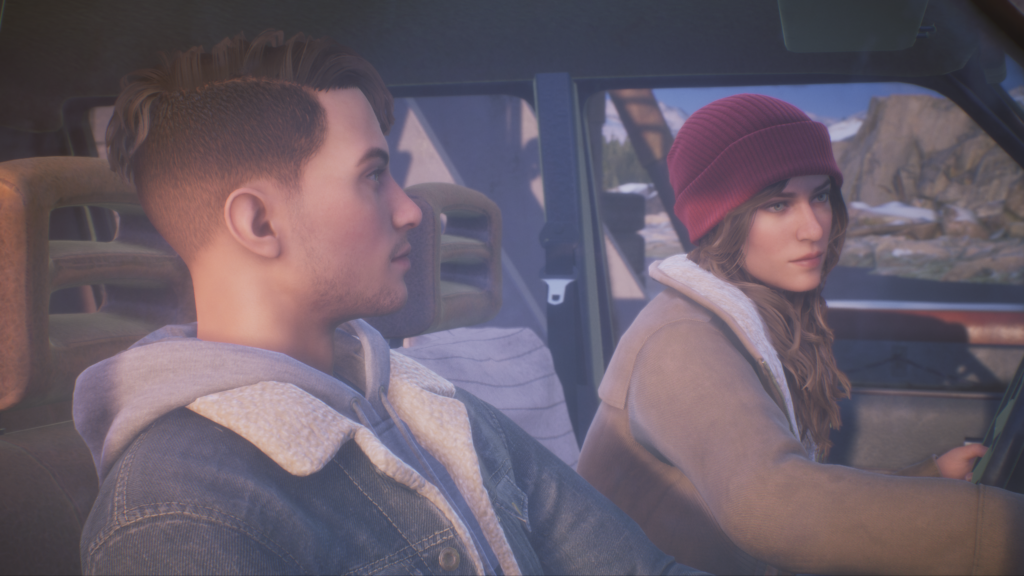
This is best shown through a microaggression in Chapter One, where Tyler’s response can shape future interactions. “When we talked through how Tyler would react to Sam in that scene, I literally got chills, because the idea was if Tyler reacts in a way that was taking a step back and placating Sam, then Sam would be worse in subsequent interactions, whereas if Tyler was more assertive and gave more of a push back, then Sam would take a step back and would be less transphobic in future interactions. And just the idea of that, and that cis people would be put in that position of trying to respond and seeing the consequences, was really powerful to me.”
Sam’s whole delivery of that scene, including his clumsy compliments, conflation of being a transvestite and transgender, and eventual mumbled cap in hand apology, all ring desperately true.
By Tyler’s very existence, Tell Me Why is a game which will go down in queer history, and for once, a queer character makes the history books not because of a wink, whisper, or a reference buried deep in the lore, but because of pride. Tyler is a fascinating, complex, and charismatic character in his own right, and it’s clear DONTNOD understood the weight on his shoulders as they were writing him.

